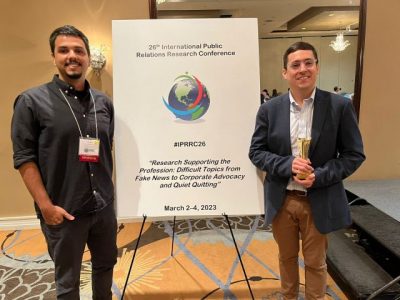‘Nation branding can be an effort not just from a government, but also from different organizations’, says International Aberje Award winner

In early March, the winner of the International Aberje Award was determined. The award recognizes International communication studies related to Brazil and Latin America, during the International Public Relations Researchers Conference (IPRRC). In addition to being a thought provoking topic, the paper also generated some interesting debates, in large part due to the format adopted for the conference. Presentations were made at different tables simultaneously and participants could go through four different studies in each round of presentations. In at least two of the rounds of discussions of this year’s winning paper that I participated in, it was easy to see how nation branding, as well as the relationships between Latin American countries and the US, especially when referring to the topic of immigration, were compelling topics for participants.
I took the opportunity to ask some questions that were related to the main discussions that came up at the tables. I also had a chance to talk to Pablo Miño, Assistant Professor at the College of Communication at Boston University, who presented the study, which he wrote with Joseph Czabovsky of the University of North Carolina at Chapel Hill.
What are the main findings you would highlight about the study?
Although this study focuses on nation branding, and Americans’ perceptions of different Latin American countries from a country reputation perspective, I think the main finding of this study is that Americans really do not know much about the realities, history, and culture of Latin American nations. We asked our respondents until what extent they remember reading, hearing, or viewing news about the eight Latin American countries under study. News of countries was low across the board (between Never to Sometimes), other than Mexico, which scored slightly above Sometimes. Chile had the least news knowledge. No country was commonly discussed with peoples’ acquaintances, but there was a relationship between the more individuals saw news about a country, the more they would talk about it with others. This finding is consistent with previous studies published in peer reviewed articles on this matter.
What was the criteria for choosing the countries in the study and how important it is to develop more research about this subject concerning Latin American countries?
We selected countries that had launched nation branding campaigns in the United States in the past. We also looked at levels of trade between each country with the U.S., size, and numbers of American tourists who visit these countries on a yearly basis.
The study focuses on the immigration issue in which Latin Americans are viewed negatively by American consumers. What do you think can be done to reverse this perception?
Unfortunately, I believe that it is hard to change negative perceptions. Something that this study taught me is that it’s not really in the hands of Latin American countries to reverse perceptions. People’s attitudes, knowledge, and motivation to learn more about on an issue are key for them to make up their minds on that problem. Taking it to the case of immigration, for example, people could have a positive attitude towards it (by saying that immigrants contribute to a country’s economy), could have a lot of accurate knowledge about immigration as an issue to have an informed opinion, and could also feel motivated to learn more about immigration and change/adjust perceptions. If people don’t have the attitudes, knowledge, and motivations to change those perceptions, then that’s a problem for countries trying to switch perceptions.
Regarding nation branding, all countries would like to be perceived as economically strong, politically stable and an attractive touristdestination. Do you see a role for companies, corporate communications and communicators in building national branding?
I absolutely think that nation branding can be an effort that stems not just from a government, but also from different organizations within a country. Traditionally, governments facilitate dialogue between the public and private sector to craft these branding campaigns. If a government aims to promote tourism, it makes much more sense to promote it along the trade associations that work in that field. Their storytelling of what they have to offer becomes of relevance to a government.
Brazil relaunched its brand, rescuing the same brand used between 2005 and 2018. This was a significant move because the previous brand carried the slogan “Visit and love us,” which had a negative connotation and raised many questions during the period it was used. As a researcher, what is your view of the previous brand, and also the one that was rescued and is used currently?
I believe that brands can act as vessels that are bound to specific political, cultural, and economic moments that shape a country’s period in history. It makes sense that the current administration wants to bring back the previous brand, since it is much more aligned with its vision of what they want Brazil to portray abroad. It’ll be interesting to see what they emphasize this time around, since times have changed, and people have different expectations these days.
The International Aberje Award seeks not only to recognize outstanding research in the field that covers Brazil and Latin America, but also to encourage and support its continuity. What are the next steps of the study and how do you intend to research this topic further?
I would love to continue exploring the influence of public relations and branding agencies from the United States in Latin American countries. I started doing research a few months ago and Brazil was the main destination for agencies like Burson-Marsteller, for example, that wanted to expand their footprint in Latin America during the 1970s and 1980s. I have plans to continue expanding this line of research and contributing to the public relations literature from a Latin American perspective.
COMENTÁRIOS:
Destaques
- Sports as an instrument of Change
- Aberje Launches Newsletter with Economic Panorama
- Charting a Path to Responsible Communication: WPRF 2023 Wraps Up in Chennai, India
- Global Alliance AGM elects new Board 2023
- Aberje discloses its positions on the Fake News Bill (PL 2630/2020)
ARTIGOS E COLUNAS
Marcos Santos Maratona da vidaMônica Brissac Thought Leadership: marca pessoal x reputação corporativaLetícia Tavares Liderança comunicadora: um tema sempre atualHamilton dos Santos Comunicação é estratégica na economia contemporâneaCarlos Parente Um salto ornamental para mergulhar no pires




























